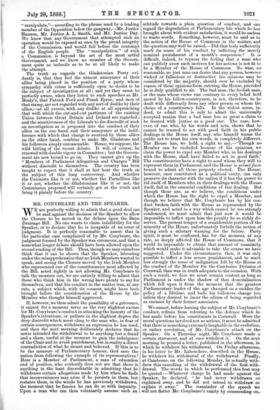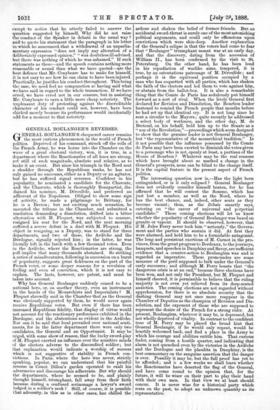MR. CONYBEARE AND THE SPEAKER.
W1i are perfectly willing to admit that a good deal can be said against the decision of the Speaker to allow the Closure to be moved in the debate upon the Bann Drainage Bill. No one wants to claim infallibility for the Speaker, or to declare that he is incapable of an error of judgment. It is perfectly reasonable to assert that in the particular case complained of by Mr. Conybeare, the judgment formed by the Speaker was erroneous, and that a somewhat longer debate should have been allowed upon the second reading of the Bill. Thus, though we may ourselves think that it can be shown that the Speaker, labouring under the misapprehension that no Irish Members wanted to speak, and seeing the Closure moved by the Irish Member who represented one of the constituencies most affected by the Bill, acted rightly in not allowing Mr. Conybeare to talk the measure out, we are entirely willing to admit that those who think him in the wrong have plenty to say for themselves, and that his conduct in the matter was, at any rate, a subject which, with its consent, might have been brought before the consideration of the House by the Member who thought himself aggrieved.
If, however, we thus admit the possibility of a grievance, it cannot for a moment serve as the very slightest excuse for Mr. Conybeare's conduct in attacking the honesty of the Speaker's intentions, or palliate in the slightest degree the deep discredit which must cling to the man who, in fear of certain consequences, withdraws an expression he has used, and then the next morning deliberately declares that he never intended the withdrawal to be anything but a fraud and a sham, useful at the moment to gain the indulgence of the Chair and to avoid punishment, but in reality a direct contradiction of what he meant and believed. If this is to be the measure of Parliamentary honour, God save the nation from following the example of its representatives ! Here is a Member of Parliament, a man of education and of position, who evidently does not see that there is anything in the least discreditable in admitting that he withdraws certain allegations made by him when he finds that inconveniences may arise if he persists in them, but restates them, in the words he has previously withdrawn, the moment that he fancies he can do so with impunity. Upon a man who can thus voluntarily assume such an attitude towards a plain question of conduct, and can regard the degradation of Parliamentary life which he has brought about with evident satisfaction, it would be useless to waste words. Something, however, must be said as to the action of the House of Commons in the matter, and the question may well be raised,—Did that body sufficiently mark its sense of his conduct by inflicting the merely nominal punishment of a month's suspension ? It is difficult, indeed, to repress the feeling that a man who can publicly avow such motives for his actions is not fit to be a Member of the House of Commons. No wise, no reasonable, no just man can desire that any person, however wicked or fallacious or destructive his opinions may be considered by the majority, should ever be excluded by reason of those opinions from entering the House, provided he is duly qualified to sit. The bad man, the foolish man, or the man whose views run contrary to every belief held sacred by his fellow-countrymen, is not, therefore, to be dealt with differently from any other person on whom the choice of a constituency falls. In the widest sense, in- deed, to admit this is only to admit the universally accepted maxim that a bad man has as great a claim to be treated with justice as a good one. The case, how- ever, of one who, by his words and acts, shows that he cannot be trusted to act with good faith in his public dealings in the House itself, nay, who himself warns the public not to trust his own words, is completely different. The House has, we hold, a right to say,' Though no Member can be excluded because of his opinions, we claim the power to expel any Member who, in his dealings with the House, shall have failed to act in good faith.' The constituencies have a right to send whom they will to represent them in Parliament, and the House is prima facie bound to admit all those properly elected. The House, however, once constituted as a political entity, can only preserve its character with the nation if it has the power to rid itself of Members who, in their dealings with the House- itself, fail in the essential conditions of fair dealing. But though these are, as we believe, the conditions under which the House has the right to expel a Member, and though we believe that Mr. Conybeare has by his con- duct broken faith with the House as represented by the Speaker, and acted in a way which cannot be too strongly condemned, we must admit that just now it would be impossible to inflict upon him the penalty he so richly de- serves. The present temper of a considerable portion of the minority of the House, unfortunately forbids the notion of giving such a salutary warning for the future. Party. spirit, it must be confessed, has for the moment, at any rate, so deeply affected the House of Commons, that it would be impossible to obtain that amount of unanimity which would make it advisable to take the course we have suggested. Under the circumstances, then, it was only, possible to inflict a less severe punishment, and to mark less strongly the sense of indignation felt by the House at the conduct of the Member for the Caanborne Division of Cornwall, than was in truth adequate to the occasion. With such a result, we fear we must remain content as long as Parliament is under the shadow of that demoralisation which fell upon it from the moment that the greatest Parliamentary leader of the age changed on a sudden the policy of a lifetime, and bade his followers change toe, unless they desired to incur the odium of being regarded- as enemies by their former associates.
We cannot, before leaving the subject of Mr. Conybeare's conduct, refrain from referring to the defence which he has made before his constituents in Cornwall. Were the moral questions involved not so serious, it must be admitted that there is something extremely laughable in the evolution, or rather revolution, of Mr. Conybeare's attack on the Speaker. On a Thursday night, Mr. Conybeare made a. certain statement, and at once withdrew it. On the next morning he penned a letter, published in the afternoon, in which he withdrew his withdrawal. On Friday afternoon, in his letter to Mr. Labouchere, described in the House, he withdrew his withdrawal of the withdrawal. Finally, at Cambome, on the following Monday, he actually with- drew this cancelling of the withdrawal of the first with- drawal. The words in which he performed this feat may be quoted :—Whatever charge he had made against the Speaker, he declared, " he had never withdrawn or explained away, and he did not intend to withdraw or explain it away." The remainder of the speech we will not flatter Mr. Conybeare's vanity by commenting on,. except to notice that he utterly failed to answer the question suggested by himself, Why did. he not raise the conduct of the Speaker in debate in the usual way ? and to quote his statement that the paragraph in his letter in-which he announced_that a withdrawal of an unparlia- mentary expression " does not imply any alteration of a deliberately expressed opinion," " was doubtless ill-advised, but there was nothing of which he was ashamed? If such statements as these—and the speech contains nothing more reasonable or sound than what we have quoted—are the best defence that Mr.. Conybeare has to make for himself, it is not easy to see how he can claim to have been injured. Practically, he justifies his conduct throughout. This being the case, we need feel no compunction at having said what we have said in regard to the whole transaction. If we have erred, we have erred not in our censure, but in assisting Mr. Conybeare to earn a little more cheap notoriety. The unpleasant duty of protesting against the discreditable character of his conduct could not, however, have been shirked merely because its performance would incidentally add for a moment to that notoriety.



































 Previous page
Previous page